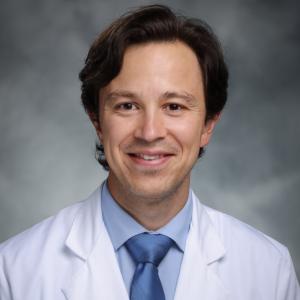Course Directors: Jared Robbins, MD, and Esther Yu, MD
This is an elective concentration on head and neck radiation oncology planning and delivery techniques to be completed over the course of 3-6 months during the Scholarly Activities year. Extensions may be granted at the Course Director's discretion to complete requirements.
The concentration will consist of two primary components:
- Participating in the planning and treatment of head and neck radiation oncology cases in the Duke Health System
- Completion of a head and neck oncology oriented scholarly project.
The goal of the concentration is to improve upon the resident's foundation of knowledge in the treatment of head and neck malignancies. It is not designed to occupy participant's entire work during that time, and concurrent other scholarly work as part of the entire year is allowed and expected.
Logistics
The primary resident on the head and neck service has priority for any cases they prefer to plan and should plan the majority of cases. Otherwise, the course director or faculty may offer appropriate cases to the concentration resident. Cases may be shared with the primary resident. Shared cases typically entail the primary resident conducting the contours under the guidance of the concentration resident. A log will be kept of all cases planned.
There will be dedicated time for volume and plan review for the cases planned by the concentration resident. A combination of the course director, concentration resident and/or the primary resident may participate in these review sessions. If the case was shared between the primary resident and the concentration resident, then the primary resident will be the main resident to review contours/plan with the attending. The concentration resident may participate in shared review at their discretion.
Virtual meetings for contour/plan review via Zoom are acceptable. In-person contour/plan review is not mandatory, nor is it expected. The concentration resident is not expected to plan or review cases while on vacation. The concentration resident is not expected to be present at simulation, scope the patient or see patients in clinic or the alcove unless they request it.
- Concentration case goal: 10-15 cases
Scholarly Project
Participants will work the faculty to identify a project. They will meet with the course director to confirm suitability for fulfilling the requirement. This project may be broad in scope and include the following:
- Clinical research (prospective or retrospective)
- Heath Services research (including access/disparity research, practice patterns, environmental impacts or intersection with other determinants of health)
- Physics research (including planning/treatment, image analysis/radiomics)
- Education research (development of training phantoms/programs educational resources)
- International research (including training programs, access)
The resident will be expected to make significant progress during the term of the concentration, though completion is not required until the end of the participant’s residency. A completed manuscript suitable for publication or equivalent work, as judged by the course director, will constitute the finished project.



